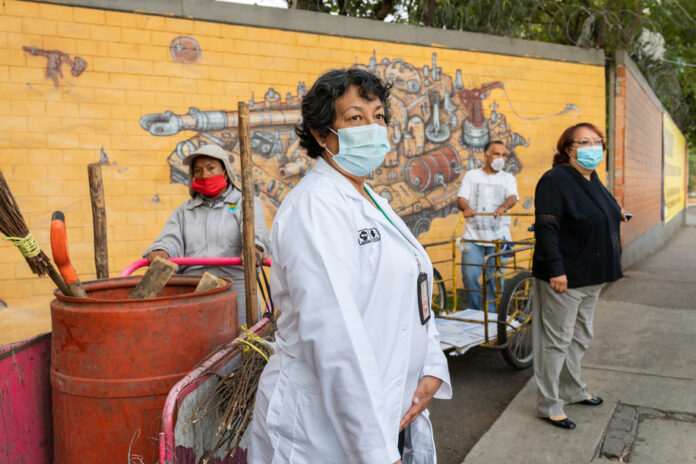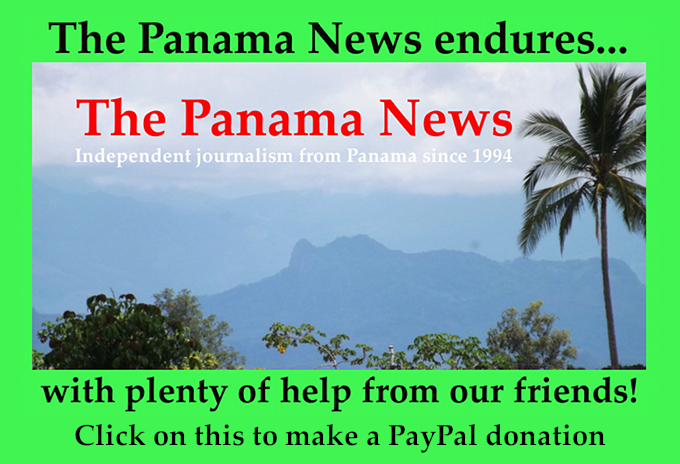Teresa Gutiérrez works with Mexico City Health Secretary at the Central de Abasto, main wholesale and retail market for consumer products in the Metropolitan Area. As part of the COVID-19 response in Mexico City, public testing was implemented in at-risk neighborhoods, as well as public surveillance to monitor local health trends. World Health Organization photo.
Conflict, climate crisis and COVID on this World Health Day
by Dr. Tedros Adhanom Ghebreyesus — Director-General of the World Health Organization
Last week, I learned from Jarno Habicht, WHO’s Ukraine representative, as he was receiving fresh health supplies to a warehouse in Lviv and he spoke about the high cost the Russian invasion is having on Ukrainian people, the damage caused to hospitals and the mental and physical impact the war is having on health workers and the civilian population.
But tragically, Ukraine is not the only emergency the world is currently facing. In Afghanistan, people are selling even their kidneys and children to survive. In Tigray, one of the longest and worst blockades in history has largely shut off deliveries of food, fuel and medicines and the region is facing a humanitarian calamity, which includes mass starvation. A worsening climate crisis is leading to countries getting hit by multiple climatic catastrophes simultaneously. In the same week last month, Australia’s coral reefs bleached as other parts of the country dealt with ‘cataclysmic floods’. And the pandemic persists with record cases and deaths being recorded in some Asian countries and intense transmission of Omicron (variant BA.1 followed by BA.2) around the world continuing to put substantial pressure on health systems.
Rising conflict, the worsening climate situation and prolonged pandemic collectively have led to the Doomsday Clock to become stuck at 100 seconds to midnight, which remains the closest the world has ever been to a civilization-ending apocalypse since its creation in 1947. It’s easy to feel despair but there are things we can do at the micro and macro levels to make a difference.
To prevent the current multidimensional crises from turning into a humanity death spiral, there needs to be concerted and creative efforts to bend the arc of history towards a solutions orientated, healthier and sustainable world. The vast majority of the world wants to live in a world free of war, where they and their families can access good work, put food on the table and have access to essential health services and quality schooling.
While it is relatively easy to kick off a conflict, the search for peace is often somewhat elusive as wars have a habit of spiraling and leading to unforeseen escalations and negative consequences. Peace underpins all that is good in our societies. We need peace for health and likewise health for peace. For health workers, WHO staff and for our humanitarian partners on the ground, war makes everything exponentially harder and sometimes even impossible.
Recognizing that peace is foundational to all our work on health, development and tackling the challenges of conflict, the climate crisis and COVID-19, I am today announcing a new ‘Peace for Health and Health for Peace’ global initiative. It aims first and foremost to foster new dialogue around health and peace. For example, the creation of humanitarian corridors so that people can access basics, including nutritious food, fuel and health services, and that no health care facilities be targeted militarily, which is a disturbing new trend seen in conflict. I will be asking other UN agencies, civil society, sport organizations, academia and business, to get behind this initiative, which I ultimately envisage will be part of an overall peace building effort that helps the people that are at highest risk of disease and death.
The highly progressive Millennium Declaration — developed at the turn of the century — outlined the nexus between peace, security, development and health. War has relegated our struggles against a heating world and the COVID-19 pandemic onto something of the back burner but both of these need international cooperation to move forward. And even in a highly divided world, progress is possible. For example, at the height of the Cold War, the USA and USSR both worked together to achieve smallpox eradication, which remains one of the great scientific achievements of our time and provides lessons to the other existential challenges of our time.
While war currently dominates the attention of decision makers and the media, the pandemic is by no means over. WHO recognizes the ongoing threat of COVID-19 and is working with countries to both track the virus and ensure that all opportunities to boost the immunity of populations are taken. The North Star goal of vaccinating 70 percent of the population is eminently doable and I’m pleased to see countries including Vietnam, Pakistan and Nigeria reflect that progress is possible if resources and efforts are effectively targeted.
Simultaneously, it is important to strengthen health systems, so countries can catch up on the many health issues that have seen progress backslide, while also preparing them for future variants of concerns and potential new pandemics. While rich countries are rolling out ‘second boosters’ – fourth doses effectively – it is incompetent and/or negligent that a few groups in those same countries are suggesting that vaccinating to similar standards is not worth it. After all, the pandemic and the resulting challenges related to supply chain chaos, remain a threat to not just health but peace and security.
Similarly the climate crisis probably remains the largest and most complex existential challenge of our time that needs unparalleled action. A heating world in general is bad for health, with seven million people dying every year just in connection with air pollution. This week, WHO released updated air pollution guidance, which highlights that more than 110 countries are now monitoring the air their citizens’ breath. It’s a good sign that countries are investing in this technology but the amount of pollutants in the air reveals the need for a transformative move away from fossil fuels, which for humanities survival must remain in the ground. With exponentially increasing fuel prices, leaders have a perfect opportunity to move rapidly toward renewable energy.
There are lessons from the pandemic on how scientific innovation can save lives and protect health systems but only if everyone has access. This is pertinent for the climate space because it’s important to make plans now so that game changing technology and know-how are shared effectively to help avert global calamity.
Conflict, the climate crisis and COVID-19 are all contributing to huge spikes in food and fuel prices, as well as inflation, which for many keep health out of reach. In the Horn of Africa and parts of the Sahel, famine is even potentially on the horizon. As part of any peace initiative, it is critical that ensuring access to quality and nutritious food is also a basic requirement, alongside other basic amenities like health and education. Whatever the crisis, I’m proud that WHO is always on the frontlines fighting to save lives and work toward health for all for everyone, everywhere.
Contact us by email at fund4thepanamanews@gmail.com
To fend off hackers, organized trolls and other online vandalism, our website comments feature is switched off. Instead, come to our Facebook page to join in the discussion.
These links are interactive — click on the boxes












